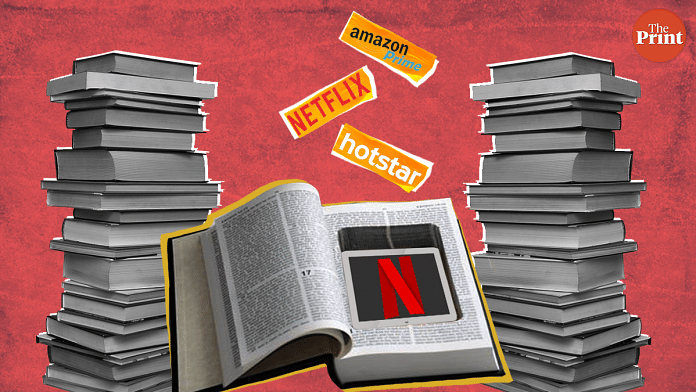With streaming platforms like Netflix and Hotstar offering a variety of content, millennials are taking to them for more than just entertainment. Some even say that their reading habit has taken a hit now.
ThePrint asks: Are online streaming channels eating into our reading habits?
Netflix, Hotstar have ensured we carry a vast pool of audio-visual content in our pockets
 Ekta Handa
Ekta Handa
Web Editor
I agree that online streaming channels are eating into our reading time. Everyone has access to the internet today and it is easier to watch a video/series online than read a book, which probably requires more concentration. We see many people watching movies or shows on their phones while on the Metro or in buses, where it is difficult and cumbersome to read a book.
Yes, one can always read a book on one’s phone, but not many people like it and not everyone can afford e-readers like Kindle.
What’s more, the internet has drastically reduced our attention span. Now people have the option to pause, stop and skip things that don’t interest them. Today, most people read when they’re at work and often preoccupied. They may have other tabs open and switch from one article to the next if something doesn’t interest them. People read on the internet differently—unlike the way they would read in print, which requires one’s full attention.
On the Internet, we skim through information and look for what we want, our eyes darting everywhere for pieces of information, links or photos.
Some studies also point to the fact that the internet has changed not only the way we read, but also how we retain that content. For the human brain, it is easier to retain visuals and audio than to retain the written word. This is where online streaming channels have an upper hand. They have made sure we carry a vast pool of audio-visual content in our pockets.
‘Netflix and Chill’ is all I do on weekends
 Anagha Deshpande
Anagha Deshpande
Journalist
I am not an avid reader, so I can’t say much about reading habit being hampered by online streaming. But binge-watching Netflix has definitely changed a lot for me.
First, it has thrown my weekend plans off track—now I just choose to ‘Netflix and chill’. Second, binge-watching has aggravated my problem of ‘procrastination’. ‘Let me Netflix first’ is practically a mantra. And I also have a new friend, ‘dark circles’—it just shows Netflix most certainly has eaten into my sleeping habits.
I think visual content is overtaking text. One of the most unfortunate examples is news. Those flashy one-minute video explainers have edged out in-depth reports/long-form stories. We now have TV adaptions of novels – like Jay Asher’s 13 Reasons Why or The Handmaid’s Tale based on Margaret Atwood’s novel of the same name.
But I think ardent readers will always pick books over any online streaming channel and non-readers will continue to ‘Netflix and chill’!
There are just too many platforms to keep track of besides your actual job
 Nandita Singh
Nandita Singh
Journalist
The simple answer is yes. The sheer amount of video content easily available online today, both in terms of quantity as well as quality, has had a significant impact on how we consume information. There are just too many platforms to keep track of— Facebook, Twitter, Instagram, Netflix, Amazon Prime, Spotify and dating apps — besides your actual job. And so, spending time with your family and managing to get some sleep, and leisure reading tend to be sacrificed at the altar of a busy life.
However, while younger generations might be choosing a visual Sacred Games over reading Shakespeare, there is enough evidence to support that millennials do actually read—they just read differently now.
A study by McKinsey in the UK tells us that the average person consumes 72 minutes of news a day, as compared to just 60 minutes in 2006—that ‘an increase driven almost entirely by people under the age of 35’.
We are fast becoming a generation that actively skims through a wide variety of topics, often simultaneously. This creates a generation that knows a little bit about a lot of things, but not a lot about most things.
Streaming channels aren’t the only trend to blame—the internet is a near limitless Encyclopedia, but navigating it effectively has become nearly impossible
If reading is not your cup of tea, then why not watch shows on Netflix/Hotstar
 Anusuya Som
Anusuya Som
Intern
Books have always been readers’ refuge—especially in times when you feel lost, it is the world of books that makes you feel at home. So, nothing can drive out one’s reading habit. And even before the digital era, when we did not have as much internet exposure as we do today, we did have television which could have caused the same damage.
It is very convenient for a ‘pseudo reader’ to blame a beautiful platform like internet that houses a plethora of ideas.
Internet and books are two very different media to propagate ideas. And I believe that if those who cannot immerse themselves in inked pages discover good content on shows, they are doing themselves some good. Although nothing compares to a bibliophile’s charismatic persona, because the knowledge you gain from books is far more detailed and specific than what you grasp from visual.




It is absolutely wrong to say that internet is damaging the reading habit. The truth is just the reverse. Books have become too expensive to afford. The carelessness of print media publishers is causing immense misery to readers. I am a regular buyer of Times of India paper edition but I read it online because font size is so small that it causes great discomfort to the eyes.